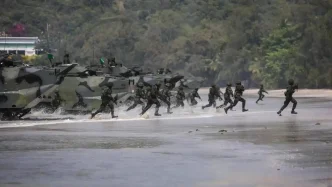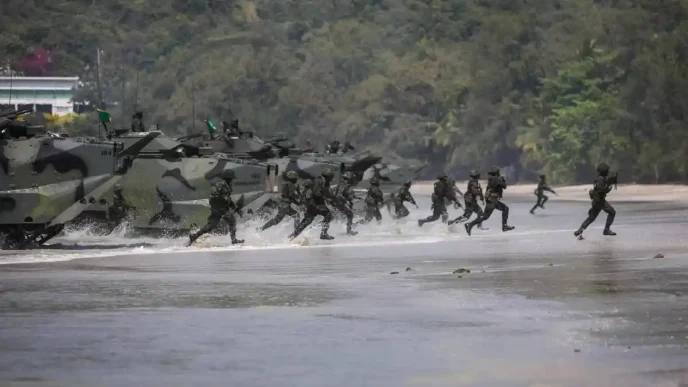In a significant step toward bolstering regional security, Indonesia and Singapore have agreed to intensify their defense cooperation, focusing on joint exercises across land, sea, air, and cyber domains. The agreement, finalized during a high-level meeting in Jakarta on July 22, 2025, underscores the growing urgency for Southeast Asian nations to strengthen military capabilities amid escalating geopolitical tensions and global conflicts.
Strengthening Bilateral Security Ties
The enhanced partnership was cemented at Indonesia’s Defense Ministry in Central Jakarta, where Defense Minister Sjafrie Sjamsoeddin hosted Vice Admiral Aaron Beng, Chief of Defence Force of the Singapore Armed Forces (SAF). The meeting, held on the sidelines of the annual dialogue between the Indonesian Military (TNI) and SAF, focused on practical measures to deepen security collaboration. Following a formal welcome ceremony, the two leaders engaged in closed-door discussions to outline the future of their military relationship.
According to a statement from Indonesia’s Defense Ministry, the agreement aims to enhance the defense capabilities of both nations while contributing to stability across Southeast Asia. The ministry expressed optimism about the future of military interactions, noting that such engagements would play an increasingly vital role in capacity building and human resource development for both countries.
The agreement builds on a foundation laid in 2022, when Jakarta and Singapore finalized a long-awaited Defense Cooperation Agreement (DCA). This earlier pact marked a turning point in their security partnership, setting the stage for more integrated military collaboration. The latest commitment reflects a shared recognition of the volatile geopolitical landscape, with regional actors increasingly prioritizing defense readiness.
Cyber Defense as a New Frontier
One of the standout elements of the recent agreement is the emphasis on cyber defense, an area where Singapore has established itself as a global leader. Indonesia, which has faced challenges in modernizing its military and digital infrastructure, is now looking to leverage Singapore’s expertise to bolster its cybersecurity capacities. Defense Ministry spokesperson Brigadier General Ferdinand Wenas Inkiriwang highlighted this focus, stating on July 22, 2025, that opportunities in cyber defense were a key topic of discussion during the meeting, as reported by Antara.
Cybersecurity has become a pressing concern for Southeast Asian nations, with the region increasingly targeted by digital threats ranging from state-sponsored attacks to criminal enterprises. Singapore consistently ranks among the top globally in cybersecurity preparedness, making it a strategic partner for Indonesia as it seeks to transform its digital defense landscape. This collaboration could serve as a model for other regional partnerships, potentially reshaping how ASEAN countries address non-traditional security threats.
Regional Stability as a Core Priority
Both nations reiterated their unwavering commitment to regional stability, emphasizing dialogue and cooperation as essential tools for maintaining peace in Southeast Asia. The Defense Ministry’s statement underscored that stability remains the highest priority, a sentiment echoed during the 26th Indonesia-Singapore Combined Annual Report Meeting (CARM-INDOSIN), which Vice Admiral Beng attended prior to his discussions with Minister Sjafrie.
During the CARM-INDOSIN high-level committee session on July 22, 2025, Beng stressed the importance of sustained cooperation grounded in mutual respect. He noted that the forum had reinforced their shared commitment to building regional stability and deepening strategic understanding between the two countries. This dialogue, alongside performance evaluations and discussions on intelligence and interoperability, highlights the comprehensive nature of the partnership.
Geopolitical Context Driving Defense Upgrades
The decision to intensify defense cooperation comes against a backdrop of rising geopolitical tensions and a surge in global conflicts, which have prompted Southeast Asian countries to reevaluate their military preparedness. From territorial disputes in the South China Sea to the broader implications of great power rivalries, the region faces a complex web of challenges that necessitate stronger security frameworks. Indonesia, as the largest economy and population in ASEAN, plays a pivotal role in shaping regional responses to these issues, while Singapore’s strategic location and advanced capabilities make it a critical ally.
Over the past decade, Jakarta has struggled to modernize its defense infrastructure, hampered by budgetary constraints and bureaucratic hurdles. Despite these challenges, the government has made concerted efforts to upgrade its military hardware and training programs. The partnership with Singapore offers not only technical support but also an opportunity to align strategies on shared concerns, such as maritime security and counterterrorism.
Singapore, meanwhile, has maintained a proactive stance on defense, investing heavily in cutting-edge technology and fostering international partnerships. Its military, though small in size, is widely regarded as one of the most advanced in the region, with a focus on precision and interoperability. By collaborating with Indonesia, Singapore can further solidify its role as a stabilizing force in Southeast Asia, while also gaining insights into the unique security dynamics of its larger neighbor.
Joint Exercises and Beyond
The agreement to increase joint exercises represents a tangible outcome of the recent talks. These exercises, spanning land, sea, air, and cyber domains, are designed to enhance interoperability and build trust between the TNI and SAF. Past collaborations, such as joint naval drills and counterterrorism simulations, have already demonstrated the value of such initiatives in fostering mutual understanding and operational synergy.
Beyond exercises, the partnership is expected to facilitate knowledge exchange and capacity building. For Indonesia, this could mean access to advanced training methodologies and technological know-how, particularly in the cyber domain. For Singapore, working closely with Indonesia provides a deeper understanding of regional threat landscapes, from insurgency in border areas to piracy in critical maritime chokepoints like the Malacca Strait.
Challenges and Opportunities Ahead
While the agreement marks a positive step, it is not without challenges. Coordinating military strategies between two nations with differing priorities and resource levels can be complex. Indonesia’s vast archipelago and diverse security needs contrast with Singapore’s compact, highly urbanized environment, potentially complicating joint operations. Additionally, political and cultural differences may occasionally strain cooperation, requiring sustained diplomatic engagement to maintain momentum.
Nevertheless, the opportunities outweigh the hurdles. By aligning their defense policies, Indonesia and Singapore can contribute to a more cohesive ASEAN security architecture, potentially encouraging other member states to pursue similar collaborations. This partnership also sends a message to external powers about the region’s commitment to self-reliance in addressing security concerns, reducing dependence on outside intervention.
A Model for ASEAN Cooperation?
The deepening defense ties between Indonesia and Singapore could serve as a blueprint for broader ASEAN collaboration. The regional bloc has long grappled with internal divisions and varying levels of military capability among its members, often hindering collective action on security matters. Bilateral agreements like this one demonstrate how targeted partnerships can bridge gaps, creating building blocks for a more unified regional approach.
Moreover, the focus on cyber defense addresses a critical gap in ASEAN’s security framework. As digital threats become more sophisticated, the need for coordinated responses grows. If successful, the Indonesia-Singapore collaboration in this area could inspire similar initiatives across the region, fostering a networked approach to cybersecurity that benefits all member states.
Looking Forward
As Indonesia and Singapore move forward with their enhanced defense cooperation, the implications for Southeast Asia’s security landscape remain a subject of keen interest. Will this partnership catalyze broader regional unity, or will it remain a bilateral endeavor? The answer may depend on how effectively the two nations navigate the practical and political challenges of their collaboration.
For now, the agreement stands as a testament to the power of dialogue and shared purpose in addressing complex geopolitical realities. As both countries prepare for an uncertain future, their commitment to joint action offers a glimmer of hope for stability in a region often defined by its fault lines.
















